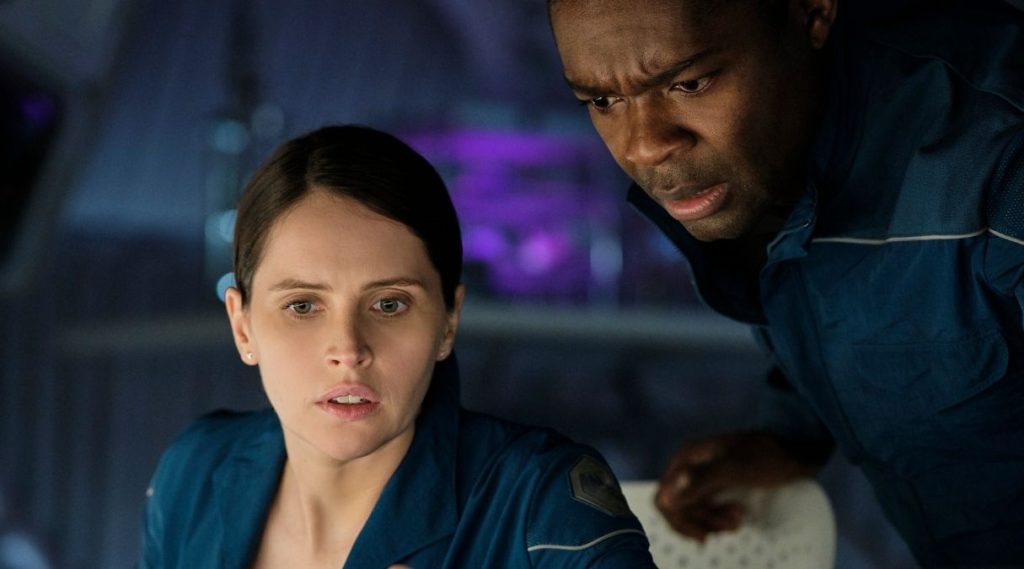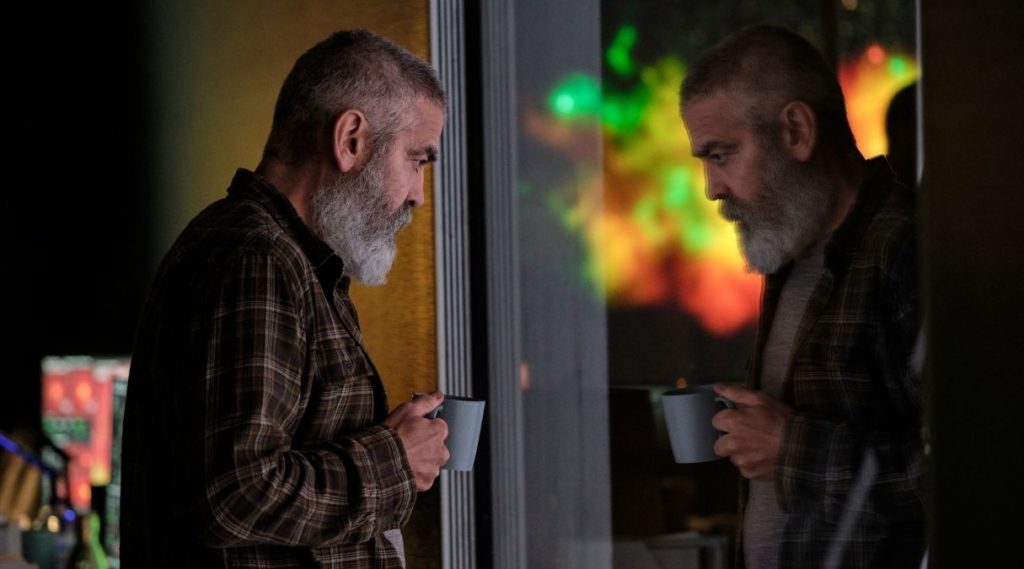Bleak films, ones where you press play and you know one of the characters is going to die, are hard to watch in 2020. I’ll be the first to admit that watching post-apocalyptic films, especially about the death of our planet, is especially grim while we hurtle towards the point of no return to correct the destruction of our climate. So, right off the bat, The Midnight Sky isn’t an easy watch. But, if you’re open to bleak films that do offer a glimmer of hope in the distance, the George Clooney-directed film based on the book, Good Morning, Midnight by Lily Brooks-Dalton is well worth the watch.
A Netflix Original, The Midnight Sky follows Dr. Augustine Lofthouse, a lone scientist left in the Arctic as the world around him dies from a human-made event. Lonely, drunk, and fully aware that he may outlive the planet, Augustine races to stop Sully and her fellow astronauts from returning home to a dangerous and uninhabitable planet. The film stars George Clooney in the lead role of Augustine alongside the talents of David Oyelowo, Felicity Jones, Kyle Chandler, Damián Bichir, and Tiffany Boone.
The film pulls together two narratives, one in space and one on Earth. We see Augustine in his research facility in the arctic. Monitoring the spreading catastrophe, drinking, taking his medicine, and falling into the loneliness of his new routine, Augustine is a shell of a man. Alone and outliving the planet, the scientist presents a somber last man on Earth. Running parallel to this, we see life on the Aether as they return from K-23, a moon of Jupiter that Augustin himself discovered was habitable for humans. On the Aether, we see relationships between the crew, the challenges of adjusting to life away from family, and the fear of returning to a planet that you’ve lost all contact with.
Working with a small cast, The Midnight Sky offers an intimate story mapped onto global catastrophe and space travel. While this is easily attainable as we focus on Augustine at the research station going through the motions, it’s harder to pull off on the Aether, given the large focus on the tech moving the crew of astronauts through space.
There is also a balance of what the future looks like and the present we know today. While on the Aether, the advancements in technology are clear. The Aether represents the science fiction of the film. Sleek suits, holograms for both emotional and navigational support, and large corridors traversed by propelling yourself rung by rung with no gravity. This is where the film leans heavily into its genre.
Back on Earth, the research facility showcases my favorite type of near-future science fiction. While the technology on the desks, the computer, and the handheld devices, are advances in science, Clooney is a ghost of the past. In his clothing and his music, we can see the pieces of our present reflected in the future. The smaller details, a futuristic pill bottle, a fire extinguisher, the cereal carry small touches of change.
That said, the differences in visual style and tone from Earth to the Aether mean that the stories seem to evolve on their own, detached from one another. Sure, there are shared connections, but both could exist without the other, and it very much feels like that as we jump from Augustine to the crew. Slowly, however, they begin to braid together, and while I want to critique their separation in the first two acts, the finale rewards you by binding them together in an emotional way. The flaw of The Midnight Sky also offers up reward, making it hard to call it a flaw. This is pushed by the film’s slow pace, which also picks up speed as the stakes rise and time becomes crucial to success.

Even with its grand science fiction narrative, The Midnight Sky is beautiful because of its humanity. Augustine’s reflection on his life and his choice to put science above family causes an ache in the audience that resonates. The guilt he feels is palpable, and Clooney’s acting in every scene is heartfelt in both his moments of pain and his moments of triumph. Additionally, on the Aether, the cast of astronauts are charismatic, with each one pulling you into their stories even when there are only small threads to hold on to. With Jones and Oyelowo deliver a heartfelt connection with each other, while Chandler, Bichir, and Boone make you care for their characters even with their limited involvement on screen.
It must also be noted that the special effects work in The Midnight Sky is superb, especially when it comes to depicting natural weather events, the view of Earth from the Aether, and when showcasing liquid in anti-gravity. The special effects never jar are never jarring. Instead, they worked to create an immersive world that helped the story.
Overall, The Midnight Sky is a film that is beautifully directed and acted. Its humanity stands out within its science fiction, and ultimately its slow pacing benefits the film’s dual narrative as it accelerates in the back half of the film. While the bleak subject matter will make the film a hard watch in 2020 of all years, it offers up just enough hope to push through and look to the future.
The Midnight Sky is available exclusively on Netflix on December 23, 2020.
The Midnight Sky
-
Rating - 8/108/10
TL;DR
Overall, The Midnight Sky is a film that is beautifully directed and acted. Its humanity stands out within its science fiction, and ultimately its slow pacing benefits the film’s dual narrative as it accelerates in the back-half of the film. While the bleak subject matter will make the film a hard watch in 2020 of all years, it offers up just enough hope to push through and look to the future.







